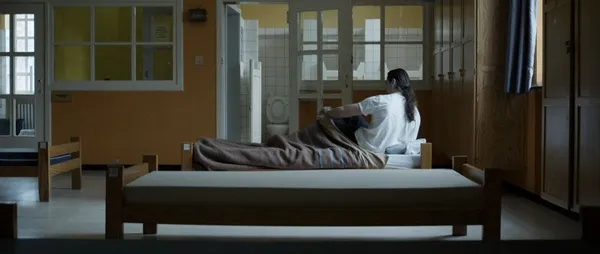Eye For Film >> Movies >> 9999 (2014) Film Review
9999
Reviewed by: Jennie Kermode

They call it the Well of Oblivion, we're told. As prisons go, it doesn't look too bad. Many inmates have their own rooms. There are comfortable social spaces and views across gardens. But for Joris, Ludo, Salem, Steven and Wilfried, that's not really the point. They shouldn't be there. They're not criminals; they're mentally ill.
Sure, some of them have done terrible things; they admit as much. But the state has recognised that they were not responsible for their actions at the time. Under the law, they ought to have been housed in specialist units where they had facilities suited to their needs and full time psychiatric support. As it is, they're left to stare at the walls. Where, in better circumstances, at least some of them might have been moved onto successful treatment programmes and released - as the criminals who live alongside them hope to be released - now they have release dates on their files marked '9999'.

At the the time this film was made, there were 1,100 people like them in Belgium's prison system.
It's easy to imagine an angry documentary on this subject, but the risk of polemic is that, as it gets its audience excited, it discourages that audience from really empathising with the individuals affected by injustice. Vermeulen has chosen, instead, to make a quiet film that allows us to spend time with the men themselves and appreciate what they're going through. Naturally this is hard going and it asks quite a bit of the viewer, but one hopes that anyone with the least appreciation of the suffering taking place here will consider it a small price for understanding. It's very rare that either prisoners or the mentally ill are given the opportunity to speak for themselves, to show and tell their own stories. All Vermeulen's subjects are lucid and intelligent, for all that we can sometimes spot traces of their illnesses in their words. All have a keen understanding of their immediate situation; one finds oneself wondering if they'd be better off without.
One of the themes that comes through strongly here, and that raises questions about the prison system more generally, is the notion that incarceration can be psychologically damaging in itself. Is it really sane to go along with it, to exhibit good behaviour? Some of the mean speak of their fear of being broken by it, of finding themselves insane in a way they can more easily recognise; they feel that the system would reward them for this. One young man explains how he ended up there because he was seeking help. Unable to get admitted at a clinic, he set fire to a bike to get attention. He's been a prisoner for eight years.
Although the focus here is on Belgium, a lot of what is said will resonate with mentally ill people and those close to them in other countries. Disabled people being shut away like this suggests little progress has been made over the past century. At least this film gives five of them a presence on our screens.
Reviewed on: 20 Oct 2015
















